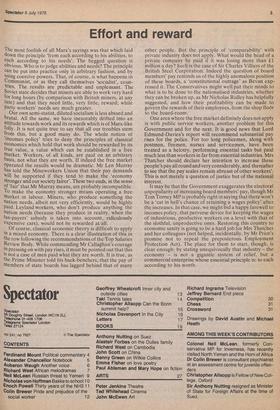Effort and reward
The most foolish of all Marx's sayings was that which laid down the principle 'from each according to his abilities, to each according to his needs'. The begged question is obvious. Who is to judge abilities and needs? The principle can be put into practice only in arbitrary fashion, and by using coercive powers. That, of course, is what happens in Communist, or as they call themselves 'socialist', counties. The results are predictable and unpleasant. The Soviet state decides that miners are able to work very hard for long hours (by comparison with British miners, at any rate) and that they need little, very little, reward; while Party workers' needs are much greater. Our own semi-statist, diluted socialism is less absurd and brutal. All the same, we have inexorably drifted into an attitude towards work and its rewards which is of Marx-like folly. It is not quite true to say that all our troubles stem from this, but a good many do. The whole notion of 'incomes policy' tries to deny the principles of classical economics which hold that work should be rewarded by its true value, a value which can be established in a free market. Workers, of all kinds, are paid on an arbitrary basis, not what they are worth. If indeed the free market Operated the results would be dramatic. Mr Len Murray has told the Mineworkers Union that their pay demands Will be supported if they tend to make the 'economy stronger and our society fairer'. These two ends, in the sense of 'fair' that Mr Murray means, are probably incompatible. To make the economy stronger means operating a free market in labour. Miners, who produce something the nation needs, albeit not very efficiently, would be highly Paid. Leyland workers, who don't produce anything the nation needs (because they produce in reality, when the tax-payers' subsidy is taken into account, ridiculously expensive cars), would not be rewarded at all.
Of course, classical economic theory is difficult to apply in a mixed economy. There is a clear illustration of this in the row following the recommendations of the Top Salaries Review Body. While commending Mr Callaghan's courage in pressing on with pay rises, it must be pointed out that this IS not a case of men paid what they are worth. It is true, as the Prime Minister told his back-benchers, that the pay of members of state boards has lagged behind that of many other people. But the principle of 'comparability' with private industry does not apply. What would the head of a private company be paid if it was losing more than 1 million a day? Such is the case of Sir Charles Villiers of the British Steel Corporation. Indeed the question of board members' pay reminds us of the highly anomalous position of these boards, a 'constitutional outrage' as Bevan expressed it. The Conservatives might well put their minds to what is to be done to the nationalised industries, whether they can be broken up, as Mr Nicholas Ridley has helpfully suggested, and how their profitability can be made to govern the rewards of their employees, from the shop floOr to the board-room.
One area where the free market definitely does not apply is with public service workers, another problem for this Government and for the next. It is good news that Lord Edmund-Davies's report will recommend substantial pay rises for the police. For too long policemen, along with postmen, firemen, nurses and servicemen, have been treated as a helotry, performing essential tasks but paid much less than workers in far from essential industries. Mrs Thatcher should declare her intention to increase these people's pay all round and very considerably, and thereafter to see that the pay scales remain abreast of other workers'. This is not merely a question of justice but of the national interest.
It may be that the Government exaggerates the electoral unpopularity of increasing board members' pay, though Mr Tom Torney MP is probably right in saying that there won't be a 'cat in hell's chance of retaining a wages policy' after the increases. In that case, we might bid a happy farewell to incomes policy, that perverse device for keeping the wages of industrious, productive workers on a level with that of the slothful, unproductive ones. Restoring this county to economic sanity is going to be a hard job for Mrs Thatcher and her colleagues (not helped, incidentally, by Mr Prior's promise not to repeal the preposterous Employment Protection Act). The place for them to start, though, is clear enough: by stating unequivocally that industry — the economy — is not a gigantic system of relief, but a commercial enterprise whose essential principle is: to each according to his worth.


































 Previous page
Previous page